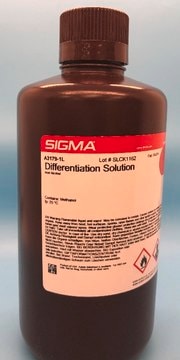Recommended Products
form
solution
Quality Level
shelf life
Expiry date on the label.
IVD
for in vitro diagnostic use
concentration
4 g/L
technique(s)
microbe id | staining: suitable
pH
2.5-3.5
application(s)
hematology
histology
storage temp.
room temp
Looking for similar products? Visit Product Comparison Guide
Application
Gill formulation No. 2 may be used for cytology and/or histology as a progressive or regressive stain depending on length of staining time.
Other Notes
4 g/L certified hematoxylin
Signal Word
Danger
Hazard Statements
Precautionary Statements
Hazard Classifications
Eye Dam. 1
Storage Class Code
12 - Non Combustible Liquids
WGK
WGK 1
Flash Point(F)
Not applicable
Flash Point(C)
Not applicable
Choose from one of the most recent versions:
Certificates of Analysis (COA)
Lot/Batch Number
Don't see the Right Version?
If you require a particular version, you can look up a specific certificate by the Lot or Batch number.
Already Own This Product?
Find documentation for the products that you have recently purchased in the Document Library.
Customers Also Viewed
Haley R Noonan et al.
Disease models & mechanisms, 9(8), 873-884 (2016-08-05)
Patients with von Hippel-Lindau (VHL) disease harbor a germline mutation in the VHL gene leading to the development of several tumor types including clear cell renal cell carcinoma (ccRCC). In addition, the VHL gene is inactivated in over 90% of
Yitzhak Reizel et al.
Genes & development, 34(15-16), 1039-1050 (2020-06-21)
The FoxA transcription factors are critical for liver development through their pioneering activity, which initiates a highly complex regulatory network thought to become progressively resistant to the loss of any individual hepatic transcription factor via mutual redundancy. To investigate the
G Gonzalez et al.
Diseases of the esophagus : official journal of the International Society for Diseases of the Esophagus, 29(6), 670-680 (2015-08-08)
Deep esophageal glands play a vital role in the protection and regeneration of the esophageal mucosa. Conditions such as gastroesophageal reflux disease and Barrett's esophagus have been associated with a change in the usual glands by oncocytic metaplasia. However, little
Irene Anastasia et al.
Cell reports, 34(11), 108873-108873 (2021-03-18)
Contacts between organelles create microdomains that play major roles in regulating key intracellular activities and signaling pathways, but whether they also regulate systemic functions remains unknown. Here, we report the ultrastructural organization and dynamics of the inter-organellar contact established by
Noora Puhakka et al.
PloS one, 12(3), e0172521-e0172521 (2017-03-09)
Traumatic brain injury (TBI) can result in several dentate gyrus-regulated disabilities. Almost nothing is known about the chronic molecular changes after TBI, and their potential as treatment targets. We hypothesized that chronic transcriptional alterations after TBI are under microRNA (miRNA)
Our team of scientists has experience in all areas of research including Life Science, Material Science, Chemical Synthesis, Chromatography, Analytical and many others.
Contact Technical Service










